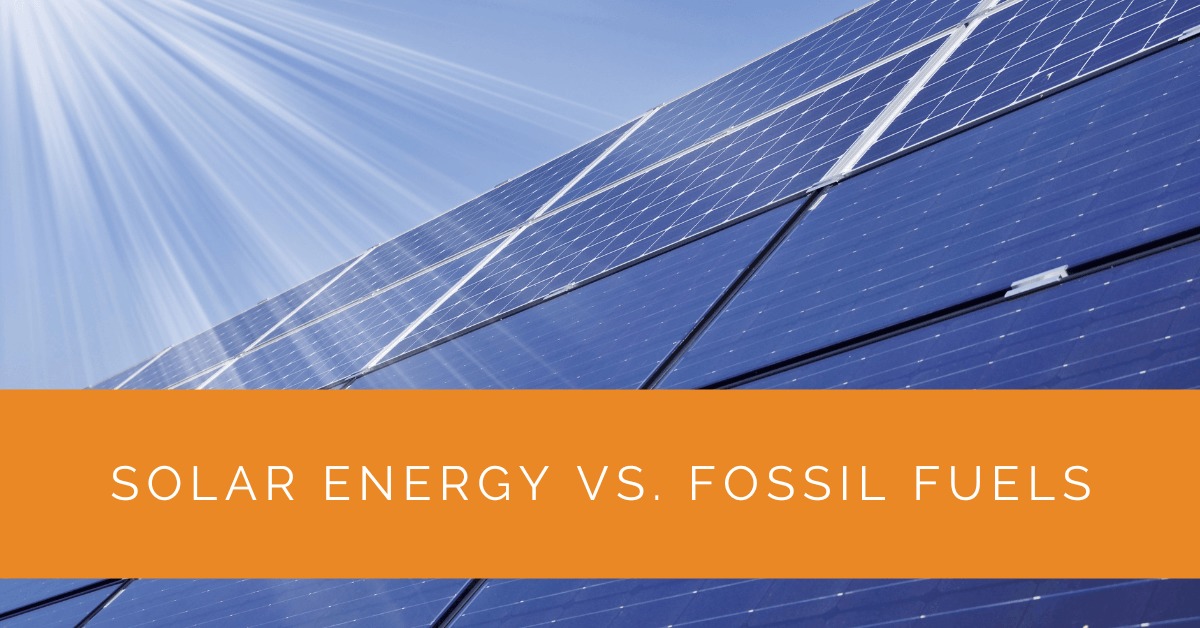As the world increasingly seeks sustainable and clean energy sources, the debate between solar energy and fossil fuels has gained significant attention. In this article, we will delve into the intricacies of these energy sources, exploring their advantages, disadvantages, costs, and environmental impacts. By understanding the key differences, you can make an informed decision when considering the transition to solar energy and its implications for the future.
Contents
- 1 Key Takeaways
- 2 Understanding Fossil Fuels
- 3 Exploring Solar Energy
- 4 Energy Costs: Solar Energy vs. Fossil Fuels
- 5 Efficiency of Solar Panels Compared to Fossil Fuels
- 6 Environmental Impact: Solar Energy vs. Fossil Fuels
- 7 Pros and Cons of Solar Energy
- 8 Solar Energy: A Key Component of Renewable Energy
- 9 The Future of Solar Energy
- 10 Case Study: Transitioning to Solar Energy – A Comparative Analysis with Fossil Fuels
- 11 Expert Insights From Our Solar Panel Installers About Solar Energy vs. Fossil Fuels
- 12 Experience Solar Excellence with Us!
- 13 Conclusion
Key Takeaways
- Solar energy offers a cleaner, renewable, and cost-effective alternative to fossil fuels, reducing greenhouse gas emissions, mitigating climate change, and promoting energy independence.
- Solar panels have witnessed significant efficiency improvements, providing a competitive edge over fossil fuels regarding energy conversion and minimizing energy losses during production.
- The future of solar energy looks promising, with ongoing technological advancements, increasing affordability, and integration with smart grids driving the transition toward a more sustainable and resilient energy landscape.
Understanding Fossil Fuels
Fossil fuels have been crucial in meeting global energy demands for centuries. These non-renewable resources, such as coal, oil, and natural gas, are derived from ancient organic matter buried deep within the Earth’s crust. However, the reliance on fossil fuels has significant environmental consequences that cannot be ignored. The extraction of fossil fuels often involves destructive mining practices and drilling operations that can harm ecosystems, disrupt habitats, and cause irreversible damage to landscapes.
Furthermore, the combustion of fossil fuels releases large amounts of carbon dioxide and other greenhouse gases into the atmosphere, contributing to the ongoing climate crisis. These emissions trap heat within the Earth’s atmosphere, leading to rising global temperatures, extreme weather events, and the acidification of oceans. Additionally, the finite nature of fossil fuel reserves means their availability will decline over time, leading to increased competition and potentially higher costs.
Exploring Solar Energy
Solar energy, on the other hand, represents a clean, abundant, and renewable power source. By harnessing the energy radiated by the sun, solar panels can convert sunlight into usable electricity through the photovoltaic effect. This process involves the interaction of photons with semiconducting materials within the solar cells, generating a flow of electrons that can be captured and utilized.
Solar panels offer several advantages over traditional fossil fuel power generation methods. Firstly, solar power generation produces zero direct emissions, significantly reducing greenhouse gas emissions and combating climate change. Secondly, solar energy systems operate silently and require minimal maintenance compared to the noise, pollution, and upkeep associated with fossil fuel power plants. Additionally, solar power is a decentralized energy source, allowing for greater energy independence and resilience at the individual and community levels.

Energy Costs: Solar Energy vs. Fossil Fuels
Solar Energy Costs
When considering solar energy costs, it’s important to analyze both the upfront investment and the long-term financial benefits. While the initial installation costs of solar panels and associated equipment may appear substantial, viewing them as an investment rather than a mere expense is crucial. The declining costs of solar panels, advancements in manufacturing processes, and economies of scale have significantly reduced the upfront costs over the years.
Moreover, solar energy systems provide a unique opportunity for homeowners and businesses to save money on their electricity bills. By generating their electricity through solar panels, individuals can offset their energy consumption from the grid, leading to considerable savings in the long run. In certain regions, net metering programs allow excess energy produced by solar panels to be fed back into the grid, earning credits that can further reduce electricity costs during periods of lower solar generation.
Furthermore, governments and local authorities often offer incentives, tax credits, and favorable financing options to promote the adoption of solar energy. These initiatives can significantly reduce the overall cost of going solar, making it a financially viable and attractive option for a wider range of individuals and businesses.
Fossil Fuel Energy Costs
The costs associated with fossil fuel energy production are subject to numerous factors that often lead to price volatility. Geopolitical tensions, conflicts, and disruptions in the supply chain can cause sudden spikes in fossil fuel prices. Additionally, the finite nature of fossil fuel resources means their availability will inevitably decline, leading to increased competition and potentially higher costs.
The extraction and transportation of fossil fuels also incur substantial expenses, which are passed on to consumers. The exploration and drilling of oil and gas reserves and the construction and maintenance of extensive pipelines and refineries contribute to the overall cost of fossil fuel energy production. These costs are further compounded by the environmental externalities associated with fossil fuels, such as pollution mitigation and the health impacts on communities near extraction sites or power plants.
In the long run, fossil fuels’ increasing costs and potential supply constraints make solar energy an attractive alternative. While the upfront costs of installing solar panels may be higher initially, the long-term financial benefits, including reduced or eliminated electricity bills, make solar energy a cost-effective choice.

Efficiency of Solar Panels Compared to Fossil Fuels
Solar panels have witnessed significant advancements in efficiency, making them increasingly competitive with fossil fuels in terms of energy conversion. Traditional fossil fuel power plants often experience energy losses during the extraction, transportation, and conversion processes. In contrast, solar panels directly convert sunlight into electricity, with minimal energy losses during the photovoltaic process.
Furthermore, the efficiency of solar panels continues to improve with technological innovations. Researchers and engineers are continuously developing new materials, designs, and manufacturing techniques to enhance the performance of solar cells and increase overall system efficiency. These advancements maximize the energy output of solar panels and make them more economically viable and attractive compared to fossil fuel-based power generation.
Environmental Impact: Solar Energy vs. Fossil Fuels
When it comes to environmental impact, solar energy outshines fossil fuels. Burning fossil fuels releases carbon dioxide, a greenhouse gas contributes to climate change and global warming. Additionally, fossil fuel combustion emits other pollutants, such as sulfur dioxide, nitrogen oxides, and particulate matter, which harm air quality and human health.
In contrast, solar energy is a clean and sustainable energy source that produces no direct emissions during operation. Solar panels do not contribute to air pollution or emit greenhouse gases, making them an environmentally friendly choice. By embracing solar energy and reducing reliance on fossil fuels, we can mitigate the adverse impacts of climate change, protect air quality, and preserve ecosystems for future generations.

Pros and Cons of Solar Energy
Solar energy offers numerous advantages that make it an appealing option for individuals, communities, and businesses:
Pros of Solar Energy
- Renewable Resource: Solar energy relies on an abundant and inexhaustible source, the sun, ensuring its availability for the foreseeable future.
- Environmental Friendliness: Solar power generation produces clean electricity without emitting greenhouse gases or pollutants, contributing to a healthier and more sustainable planet.
- Energy Independence: By harnessing solar energy, individuals and communities can reduce dependence on the traditional grid and achieve greater self-sufficiency in meeting their energy needs.
- Job Creation: The rapid growth of the solar industry has led to the creation of numerous jobs, driving economic growth and providing employment opportunities in installation, manufacturing, and research sectors.
- Scalability: Solar energy systems can be easily scaled up or down to match varying energy demands, making them flexible and adaptable to different settings and requirements.
Cons of Solar Energy
- Intermittency: Solar energy production is subject to variations due to weather conditions and the availability of sunlight. This intermittency necessitates using energy storage solutions or grid integration to ensure a continuous and reliable power supply.
- Upfront Costs: The initial investment for installing solar panels can be higher than traditional energy sources. However, the decreasing costs of solar panels and the long-term savings on electricity bills offset the upfront expenses over time.
- Space Requirements: Solar panel installations typically require sufficient space on rooftops or open areas. Not all properties may have the necessary area for optimal solar panel placement, limiting the feasibility of solar energy adoption in certain locations.

Solar Energy: A Key Component of Renewable Energy
Solar energy and wind energy play a crucial role in the shift towards a more sustainable and renewable energy future. The intermittent nature of solar power generation is complemented by wind energy, which often peaks during different times of the day or year. Combining these two renewable energy sources can achieve a more reliable and consistent supply of clean energy. This synergy between solar and wind power helps address the intermittency challenges associated with each source and provides a more stable power generation system.
In addition to wind energy, solar power is a key component of the broader renewable energy landscape. Integrating solar energy into the grid promotes diversification and reduces dependence on fossil fuels. By embracing solar energy, we can decrease our reliance on finite resources, such as coal, oil, and natural gas, and transition towards a more sustainable and environmentally friendly energy mix.
Furthermore, the scalability of solar energy systems makes them adaptable to various applications and scales of use. From small-scale residential installations to large solar farms, solar energy can be deployed across different sectors, including residential, commercial, and industrial, catering to the specific energy needs of diverse consumers. This flexibility allows for a decentralized approach to energy production, empowering individuals and communities to actively participate in the transition towards a cleaner and more sustainable energy future.
The Future of Solar Energy
The future of solar energy looks promising as technological advancements and innovations continue to drive progress in the field. Researchers and engineers constantly improve solar panel efficiency, durability, and aesthetics. New materials, such as perovskite solar cells, hold great potential for enhancing energy conversion efficiency and reducing production costs.
Moreover, energy storage solutions, such as batteries, are becoming more efficient and affordable, addressing the intermittency challenge of solar energy. Battery storage enables the capture and utilization of excess energy generated during peak sunlight hours, ensuring a reliable power supply even during periods of low or no sunlight.
As governments, businesses, and individuals increasingly recognize solar energy’s benefits, research, and development investment continues to grow. This investment fuels innovation, resulting in improved solar technologies, streamlined manufacturing processes, and cost reductions. As a result, solar energy is becoming more accessible and economically viable, making it an attractive choice for a wide range of energy consumers.
The future of solar energy extends beyond individual installations and reaches into the realm of smart grids and interconnected energy systems. Integrating solar power with advanced grid infrastructure allows for better management, distribution, and optimization of electricity resources. This intelligent grid infrastructure can intelligently balance supply and demand, optimize energy consumption, and enhance overall grid resilience.
Case Study: Transitioning to Solar Energy – A Comparative Analysis with Fossil Fuels
Background
At Solar Panels Network USA, we are dedicated to promoting sustainable energy solutions by helping individuals and businesses transition from fossil fuels to solar energy. This case study explores a residential project’s journey from relying on traditional fossil fuels to embracing solar power, highlighting the benefits, challenges, and outcomes of this transition.
Project Overview
The homeowners had been relying on fossil fuel-based electricity for years, experiencing rising energy costs and environmental concerns. Motivated by the need for a cleaner, more cost-effective energy source, they decided to transition to solar energy. Our goal was to provide a comprehensive solar solution that would meet their energy needs while significantly reducing their carbon footprint.
Implementation
- Assessment and Planning: We conducted an initial assessment to understand the homeowners’ energy consumption patterns and the potential for solar energy generation. This involved analyzing their monthly electricity usage and the available rooftop space for solar panel installation.
- System Design: Based on the assessment, we designed a 5 kW solar power system using high-efficiency photovoltaic panels. The system included an inverter, battery storage for excess energy, and a monitoring system to track energy production and consumption.
- Installation: The installation process was straightforward, involving the mounting of solar panels on the south-facing roof to maximize sunlight exposure. The inverter and battery storage were installed in the garage, ensuring easy access for maintenance and monitoring.
Results
The transition to solar energy provided several benefits for the homeowners:
- Cost Savings: The homeowners experienced a significant reduction in their monthly electricity bills. The solar system generated enough energy to meet their daily needs, with excess energy stored for later use.
- Environmental Impact: By switching to solar energy, the homeowners reduced their carbon footprint, contributing to lower greenhouse gas emissions and a cleaner environment.
- Energy Independence: The solar system provided a reliable and sustainable energy source, reducing their dependence on the traditional power grid and shielding them from fossil fuel price volatility.
- Increased Property Value: The addition of a solar power system increased the property’s value, making it an attractive feature for potential buyers in the future.
Summary
Our project with the residential property demonstrates the practical and environmental benefits of transitioning from fossil fuels to solar energy. The use of high-efficiency solar panels and energy storage solutions provided a reliable, cost-effective, and eco-friendly energy source. At Solar Panels Network USA, we continue to deliver tailored solar solutions that meet our clients’ unique needs, promoting sustainable and efficient energy use.
Expert Insights From Our Solar Panel Installers About Solar Energy vs. Fossil Fuels
Solar energy provides a sustainable alternative to fossil fuels by harnessing the sun’s power to generate electricity without emitting greenhouse gases. This not only helps in mitigating climate change but also ensures energy security for future generations.
Senior Solar Installer
One of the significant advantages of solar energy is its decentralized nature. Unlike fossil fuels, which require extensive infrastructure and centralized power plants, solar panels can be installed on rooftops, bringing power generation closer to the point of consumption.
Lead Solar Technician
The advancements in solar panel technology have significantly improved their efficiency, making them a competitive choice compared to fossil fuels. With ongoing research and development, we can expect even higher efficiency and lower costs in the near future.
Chief Solar Engineer
Experience Solar Excellence with Us!
Trust in Solar Panels Network USA, where our seasoned experts deliver top-quality solar solutions for homes and businesses nationwide. With a legacy of countless successful installations and a commitment to sustainable energy, we’re your reliable partner in the solar journey. Ready for a brighter, eco-friendly future? Call us now at (855) 427-0058 and harness the power of the sun!
Conclusion
Solar energy emerges as a clean, renewable, and economically viable alternative to fossil fuels. Its environmental benefits, including reduced carbon emissions and air pollution, and its long-term cost savings make it an attractive choice for individuals, communities, and businesses. Although challenges such as intermittency and upfront costs exist, advancements in technology, supportive government policies, and increasing public awareness drive the adoption of solar energy.
As we strive for a more sustainable future, embracing solar energy as a key component of our energy mix is crucial. By reducing our reliance on fossil fuels and harnessing the sun’s power, we can mitigate climate change, protect the environment, and pave the way for a cleaner, healthier, and more prosperous future for future generations. Embracing solar energy is not just a wise choice but an imperative step towards a more sustainable and resilient planet.
About the Author
Solar Panels Network USA stands at the forefront of solar energy solutions, driven by a team of seasoned solar engineers and energy consultants. With over decades of experience in delivering high-quality solar installations and maintenance, we are committed to promoting sustainable energy through customer-centric, tailored solutions. Our articles reflect this commitment, crafted collaboratively by experts to provide accurate, up-to-date insights into solar technology, ensuring our readers are well-informed and empowered in their solar energy decisions.

